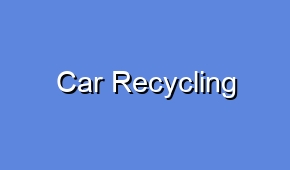Car Recycling

Car recycling involves dismantling and reusing the components of old vehicles to reduce waste and conserve resources. It helps in the recovery of valuable materials like metal, glass, and plastic while minimizing environmental pollution.
Car recycling is an essential process that aims to reduce environmental impact by reusing and repurposing old vehicles. By dismantling and disposing of cars in an eco-friendly manner, we can conserve resources and minimize waste. Recycling cars not only helps in reducing the carbon footprint but also recovers valuable materials such as metals and plastics. With advanced technology and innovative techniques, the car recycling industry has made significant progress in sustainable practices. By choosing to recycle your old vehicle, you are contributing to a cleaner and greener future for generations to come.
| Car recycling helps reduce waste and conserve natural resources. |
| Recycling cars can prevent harmful chemicals from polluting the environment. |
| Reusing car parts reduces the need for new manufacturing, saving energy and emissions. |
| Car recycling contributes to the circular economy and supports sustainable practices. |
| Recycled car materials can be used in various industries, reducing raw material consumption. |
- Car recycling reduces landfill waste and promotes a cleaner environment.
- Recycled car parts can be sold at affordable prices, benefiting consumers.
- Proper car disposal ensures the safe handling of hazardous substances.
- Recycling old cars helps conserve energy and reduces greenhouse gas emissions.
- Automotive recycling supports job creation and economic growth in the recycling industry.
What is car recycling and why is it important?
Car recycling is the process of dismantling and reusing vehicles that have reached the end of their useful life. It is important because it helps reduce waste, conserve resources, and minimize environmental impact.
How does car recycling work?
Car recycling involves several steps such as draining fluids, removing parts for reuse, and shredding the remaining metal. The shredded metal is then separated and sent for further processing.
What are the benefits of car recycling?
Car recycling offers various benefits including reducing landfill waste, conserving natural resources, and preventing pollution caused by the extraction of raw materials.
Can all types of cars be recycled?
Yes, most types of cars can be recycled, including old, damaged, and non-working vehicles.
Where can I recycle my car?
You can recycle your car at authorized recycling centers, scrapyards, or through car manufacturers’ take-back programs.
What happens to the recycled parts of a car?
The recycled parts of a car can be refurbished and sold as used parts or used for repairing other vehicles.
Is car recycling regulated by the government?
Yes, car recycling is regulated by government agencies to ensure proper disposal of hazardous materials and compliance with environmental standards.
What are the environmental impacts of car recycling?
Car recycling helps reduce greenhouse gas emissions, conserve energy, and prevent the release of toxic substances into the environment.
Are there any financial incentives for recycling my car?
Some countries and regions offer financial incentives such as cash rewards or tax credits for recycling old cars.
What should I do before recycling my car?
Before recycling your car, you should remove personal belongings, cancel the registration, and transfer ownership to the recycling facility.
Can I recycle a car that is still in good condition?
If your car is in good condition, consider selling or donating it instead of recycling to extend its lifespan.
What materials are recycled from cars?
Commonly recycled materials from cars include steel, aluminum, copper, plastic, glass, rubber, and various fluids.
How are hazardous materials disposed of during car recycling?
Hazardous materials such as batteries, oil, and refrigerants are carefully drained and disposed of according to environmental regulations.
What are the economic benefits of car recycling?
Car recycling contributes to job creation, stimulates the economy through the sale of recycled materials, and reduces the need for new resource extraction.
Can I get a tax deduction for recycling my car?
In some countries, you may be eligible for a tax deduction when you donate your car to a registered charity for recycling purposes.
Are there any alternatives to car recycling?
Alternatives to car recycling include selling or trading in your car, repurposing it for other uses, or donating it to charitable organizations.
What should I look for in a reputable car recycling facility?
Look for a facility that is licensed, follows environmental regulations, and provides proper documentation for the recycling process.
Can I recycle a car without its title?
Some car recycling facilities may accept cars without titles, but it is advisable to check with the facility beforehand.





















